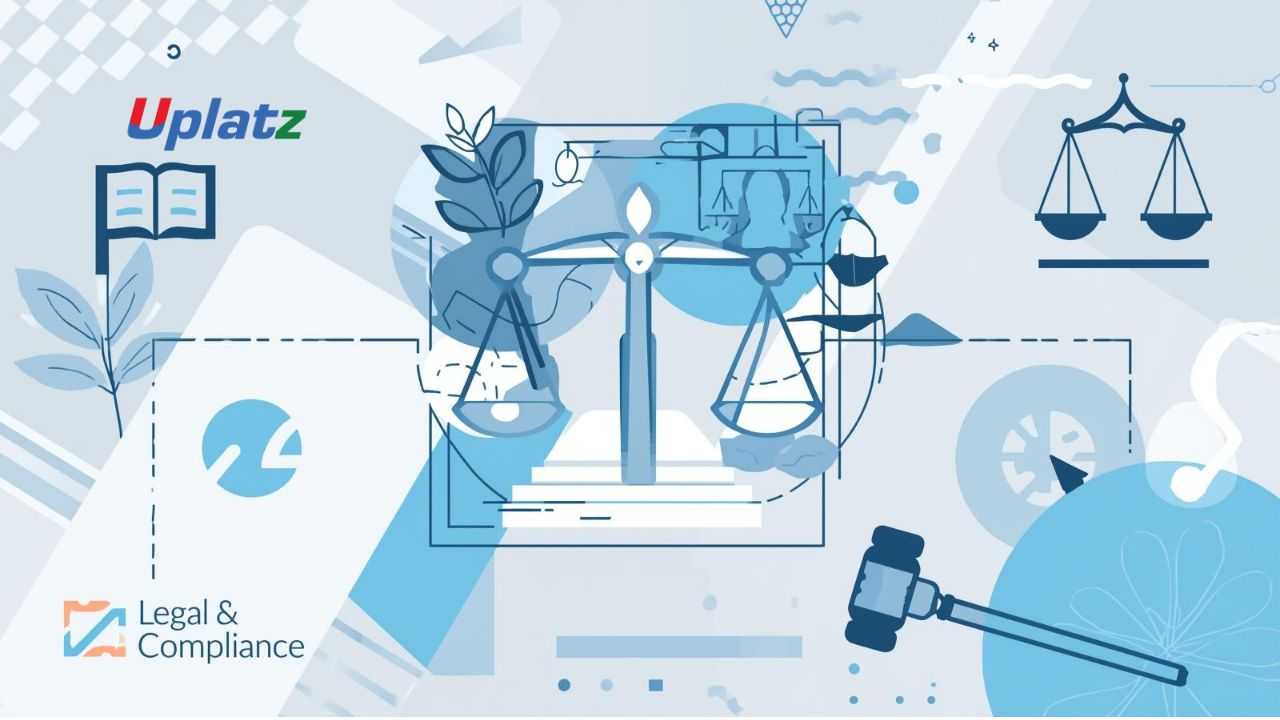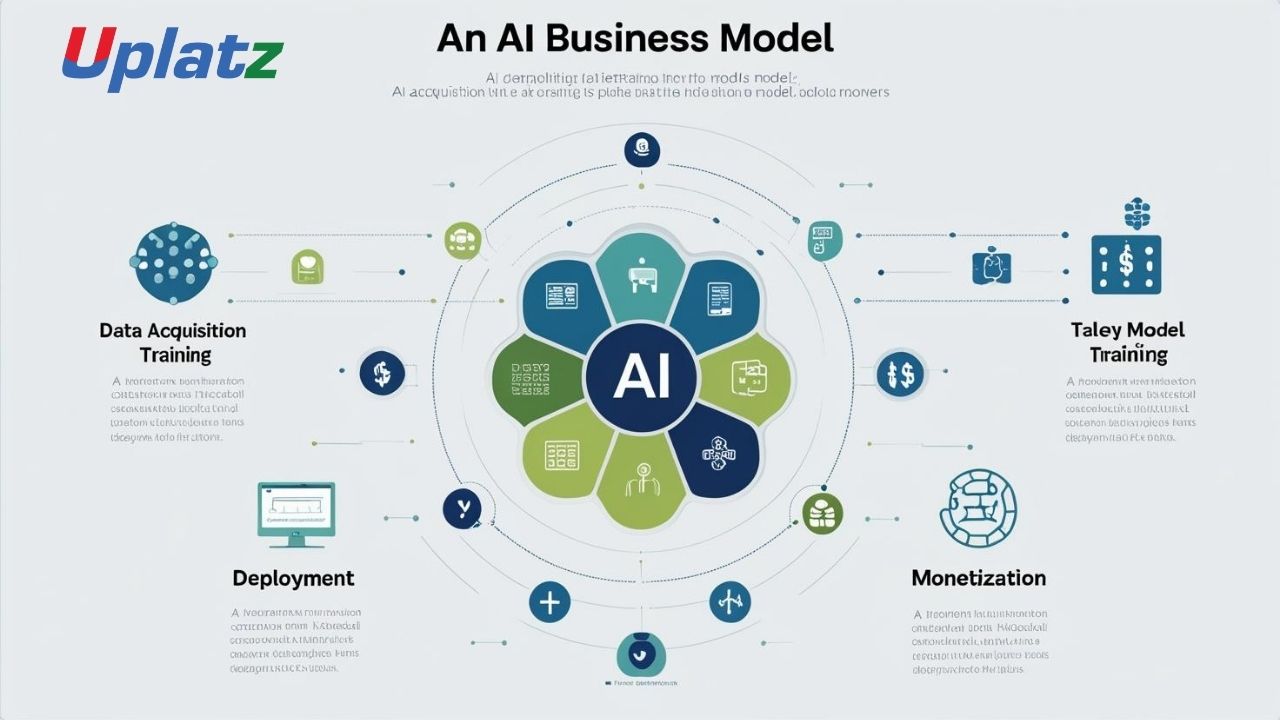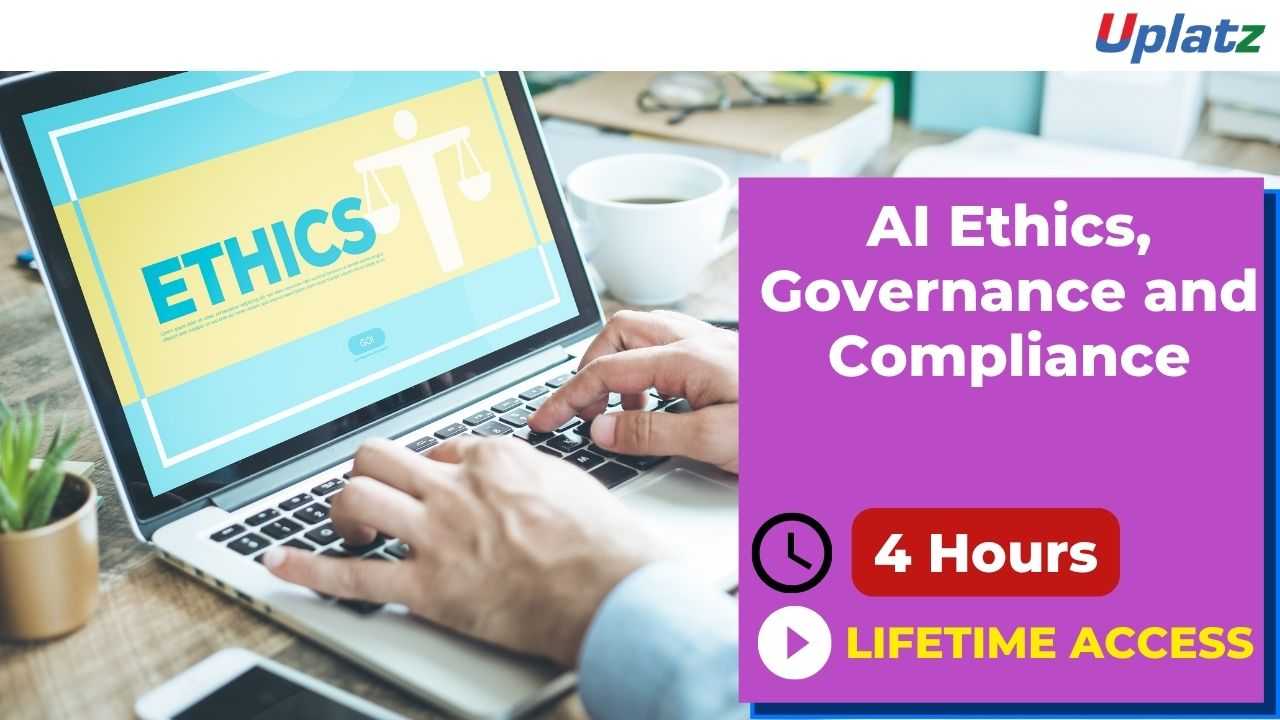AI in Legal & Compliance
Leverage artificial intelligence to automate legal processes, ensure compliance, and enhance governance. Price Match Guarantee
Full Lifetime Access
Access on any Device
Technical Support
Secure Checkout
Course Completion Certificate
Price Match Guarantee
Full Lifetime Access
Access on any Device
Technical Support
Secure Checkout
Course Completion Certificate
 91% Started a new career
BUY THIS COURSE (
91% Started a new career
BUY THIS COURSE (GBP 12 GBP 29 )-
 78% Got a pay increase and promotion
78% Got a pay increase and promotion
Students also bought -
-

- AI Business Model Design
- 10 Hours
- GBP 29
- 10 Learners
-

- AI Cybersecurity
- 10 Hours
- GBP 29
- 10 Learners
-

- AI Ethics, Governance, and Compliance
- 4 Hours
- GBP 29
- 2529 Learners

AI in Legal & Compliance – Transforming Governance and Risk Management through Intelligence
AI in Legal & Compliance is a specialized course designed to explore how artificial intelligence is revolutionizing the legal, regulatory, and compliance landscape. With growing data volumes, complex regulatory frameworks, and rapid digital transformation, organizations are increasingly turning to AI for contract analysis, risk monitoring, compliance automation, and regulatory intelligence.
This course bridges the gap between legal expertise and data-driven technologies. Learners will explore how Natural Language Processing (NLP), Machine Learning (ML), and Knowledge Graphs are applied in contract review, due diligence, fraud detection, and policy management.
Through practical case studies and projects, you’ll gain the knowledge to design and implement AI-powered compliance systems that ensure transparency, accountability, and efficiency while adhering to ethical and legal standards.
Why Learn AI in Legal & Compliance?
Legal and compliance functions are evolving rapidly as AI becomes integral to organizational integrity and risk management. Traditional manual reviews and audits are being replaced by AI-driven document analysis, anomaly detection, and predictive compliance systems that can process millions of records in seconds.
By mastering AI for legal and compliance, you can:
- Automate document and contract management tasks.
- Reduce risk through real-time compliance alerts.
- Enable faster regulatory reporting and policy adherence.
- Improve transparency and accountability in governance.
Global law firms, financial institutions, and regulatory bodies increasingly rely on AI to enhance accuracy, speed, and fairness—creating a growing demand for professionals skilled in AI-driven compliance systems.
What You Will Gain
By completing this course, you will:
- Understand how AI is reshaping legal operations and regulatory compliance.
- Learn NLP applications for contract review and document intelligence.
- Build risk prediction and fraud detection models using ML.
- Apply AI tools for policy management and regulatory monitoring.
- Explore the use of automation and chatbots for compliance training and support.
- Understand the ethical and governance considerations in AI deployment.
Hands-on projects include:
- Automating contract clause extraction using NLP.
- Developing a compliance monitoring dashboard for risk alerts.
- Implementing a legal chatbot for document discovery and client support.
Who This Course Is For
This course is ideal for:
- Legal Professionals & Compliance Officers seeking to integrate AI in workflows.
- Risk Managers & Governance Experts automating regulatory oversight.
- AI & Data Science Practitioners applying NLP and ML to legal data.
- Policy Makers & Auditors implementing intelligent compliance systems.
- Students & Researchers exploring AI ethics, law, and governance intersections.
This course provides both the technical foundation and applied knowledge to build and manage intelligent compliance solutions in complex organizational environments.
By the end of this course, learners will be able to:
- Explain how AI is transforming legal and compliance processes.
- Apply NLP to extract, classify, and analyze legal documents.
- Build ML models for fraud detection and risk assessment.
- Automate regulatory monitoring and reporting workflows.
- Develop intelligent assistants for legal research and documentation.
- Understand ethical, privacy, and bias implications in AI systems.
- Implement AI-driven compliance analytics and dashboards.
- Integrate AI tools into governance and audit frameworks.
- Apply knowledge graphs for legal knowledge management.
- Evaluate AI solutions for accuracy, accountability, and compliance.
Course Syllabus
Module 1: Introduction to AI in Legal and Compliance
AI fundamentals, industry trends, and transformation of the legal sector.
Module 2: Overview of LegalTech and RegTech Ecosystems
Understanding how technology is reshaping governance, risk, and compliance.
Module 3: Natural Language Processing in Legal Documents
Entity recognition, clause extraction, summarization, and semantic analysis.
Module 4: Machine Learning for Risk and Compliance Analytics
Predictive modeling for fraud detection, policy breaches, and anomaly identification.
Module 5: Knowledge Graphs and Legal Ontologies
Representing and reasoning over complex legal data structures.
Module 6: Contract Intelligence and Automation
AI for contract lifecycle management and due diligence.
Module 7: Regulatory Monitoring and Reporting Systems
Automating compliance tracking and regulatory change management.
Module 8: Ethics, Governance, and Explainability in Legal AI
Bias mitigation, data privacy, model transparency, and accountability.
Module 9: AI for Fraud Detection and Risk Scoring
Detecting unusual transactions, insider threats, and non-compliance patterns.
Module 10: Conversational AI and Legal Chatbots
Building virtual assistants for client support and compliance training.
Module 11: Case Studies and Industry Applications
Real-world implementations in law firms, banking, and government.
Module 12: Capstone Project – Intelligent Compliance Automation
Design and deploy an AI-powered compliance system integrating NLP, ML, and automation for a legal use case.
Upon successful completion, learners will receive a Certificate of Mastery in AI in Legal & Compliance from Uplatz.
This certification validates your ability to apply artificial intelligence techniques to legal operations, governance, and compliance frameworks. It demonstrates your expertise in:
- Automating complex legal workflows through NLP and ML.
- Enhancing compliance monitoring, auditing, and policy enforcement with AI.
- Ensuring ethical, transparent, and explainable use of AI in regulatory environments.
This credential recognizes your professional capability to lead AI transformation initiatives in law firms, corporate governance teams, financial institutions, and regulatory bodies.
Expertise in AI for Legal and Compliance prepares professionals for dynamic and interdisciplinary roles, including:
- Legal Data Scientist
- Compliance Automation Specialist
- AI Legal Engineer
- Governance & Risk Analyst
- RegTech Product Manager
- AI Ethics & Policy Consultant
These roles are rapidly expanding as organizations embrace AI for operational efficiency, transparency, and adherence to global regulations such as GDPR, HIPAA, and ESG frameworks.
- How is AI transforming the legal industry?
AI automates contract analysis, legal research, and compliance workflows, reducing time and improving accuracy. - What is RegTech?
RegTech refers to technology solutions that automate regulatory compliance and risk management processes. - How is NLP used in legal AI applications?
It helps extract clauses, identify entities, summarize contracts, and classify legal documents. - What are knowledge graphs in the legal context?
They represent relationships between laws, regulations, and entities for advanced reasoning and search. - What is compliance automation?
The use of AI to automatically monitor, detect, and report policy or regulatory violations. - What challenges exist in applying AI to legal data?
Data privacy, interpretability, lack of standardized formats, and potential bias in training datasets. - What role does explainable AI (XAI) play in legal systems?
It ensures transparency in AI decisions, supporting accountability and auditability. - What are examples of AI tools in LegalTech and RegTech?
Kira Systems, Luminance, ThoughtRiver, Ayfie, and IBM Watson Legal. - How can AI support fraud detection in compliance?
By analyzing transaction patterns and identifying anomalies indicating misconduct. - What ethical considerations must be addressed in Legal AI?
Bias, data privacy, informed consent, fairness, and model accountability.









